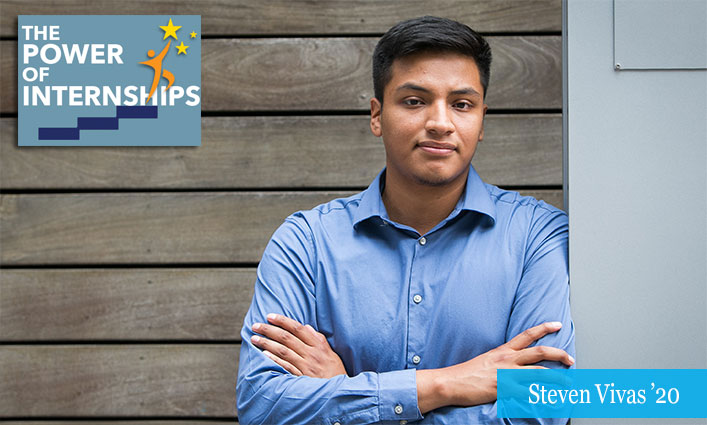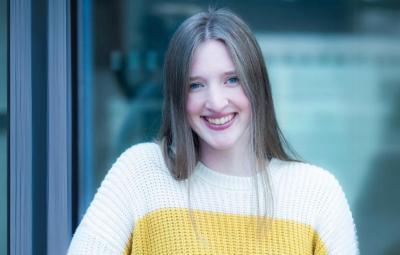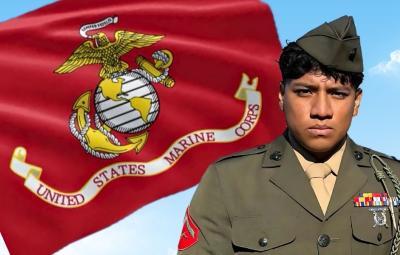
For Steven Vivas ’20, an alumnus with a degree in Criminology and a minor in Latin American and Latinx Studies, getting an internship during his sophomore year was the key to his current job and career path. The Queens, New York native had never had any professional experience, but Associate Professor Isabel Martinez, Ph.D. saw his potential and introduced him to Safe Passage, a non-profit organization that helps represent unaccompanied minors. “Professor Martinez has the Unaccompanied Latin American Minor Project where she takes students from John Jay and places them in various non-profits in New York City where they can get experience working with immigrants,” says Vivas, whose parents immigrated to the United States from Mexico when they were younger. “I was pretty intimidated at first because the internship was my first professional experience. I wasn’t really sure about what to expect. As an intern, I thought I would be running around to get coffee—like I’d seen on television shows—but the staff at Safe Passage was amazing. They took me in and taught me a lot of what I know now. They let me get first-hand experience interacting with clients and learning about the court systems. The connections I made there put me on the path that I’m on now.” We sat down with Vivas to learn more about his internship experience and his new fellowship with the Immigrant Justice Corps (IJC).
“As an intern, I thought I would be running around to get coffee—like I’d seen on television shows—but the staff at Safe Passage was amazing. They took me in and taught me a lot of what I know now.” —Steven Vivas
How did you become interested in becoming an advocate for immigrants? Did you always know that you wanted to work in this field?
Finishing high school, I wasn’t sure what I wanted to do. I had the impression that I wanted to do something that was law related. I wasn’t sure if that would be law enforcement or pursuing law school. I decided that John Jay was the best fit for my goals. Once I got to John Jay, I became interested in studying immigrant rights because I come from an immigrant background. It was something I was submerged in, especially with my parents and their history with the immigration system. In my classes I learned more about the immigration system and I found different issues that I thought were problematic. This made me want to be a part of the system to work on the problems within it.
“Once I got to John Jay, I became interested in studying immigrant rights because I come from an immigrant background.” —Steven Vivas
After Professor Martinez helped you get the internship at Safe Passage, what was the experience like?
There was a lot of translations and interpretations that I was asked to do. I would be in meetings interpreting for clients and it was a great experience for me because I was able to interact with people who lived totally different lives from mine. At the time, a lot of the clients were around my age. It was a big reflection of what the world is like for other people. I realized that if things had been different, it could have been me sitting in their seat. I really enjoyed being able to help them.
Were there any specific experiences at Safe Passage that particularly stuck with you?
During my time as an intern at Safe Passage, there was a case that was in progress with a young client from Guatemala. After my internship was officially over, Safe Passage hired me as a paralegal and I was able to work on his case and watch as it developed. Toward the end of my employment, I got to see him get his green card and travel back to his home country. When he went back to Guatemala, he sent the office pictures of his whole family. It was an emotional experience for me to see those photos. Interacting with him and guiding him through that process was very long, and there were some bumps in the road with different administrations, but at the end of the day, we were able to get him his green card. That’s definitely a memory I keep with me.
How did you learn about your current fellowship at Immigrant Justice Corps?
I first heard about IJC while I was a sophomore at John Jay and interning at Safe Passage. There were some IJC Justice Fellows (awarded to recent law school graduates) working at Safe Passage, and they told me about the IJC Community Fellowship program (awarded to recent college graduates), and it sounded like a great opportunity. I immediately applied after I graduated, and now I have a two-year fellowship. In the IJC Community Fellowship program, we become accredited representatives with our own cases. I will be representing certain clients before the United States Citizenship Immigration Services, and mainly work on asylum petitions, family-based petitions, special immigrant juveniles, and naturalization applications.
“Ultimately, after my experience with Safe Passage and IJC, I think I want to work with immigrant youth. It’s something I have grown passionate about.” —Steven Vivas
How has your experience with Immigrant Justice Corps differed from your experience at Safe Passage?
At Safe Passage, I was a paralegal and mainly helped the attorneys with their cases. They gave me a lot of responsibilities and opportunities to interact with clients. But here at IJC, I’m going to be an accredited representative, and soon, when my application is approved, I will be the person on the application signing on behalf of clients. Some things still overlap—I am still translating documents and interacting with clients—but I’ll have more autonomy.
After your Immigrant Justice Corps fellowship is over, what do you hope to do?
My hope is to go to law school because my goal is to be an immigration attorney one day. Luckily, my dreams are really supported by IJC. Ultimately, after my experience with Safe Passage and IJC, I think I want to work with immigrant youth. It’s something I have grown passionate about.
What message do you want to tell current John Jay students?
There is support everywhere at John Jay. For me, that special support came from the Latin American and Latinx Studies Department. Professor Martinez really motivated me and pushed me out of my comfort zone. I was very reserved coming in my first year of school. She saw the qualities that I had and she pushed me to try new things and have new experiences. She is someone I am very grateful for.
“Your best support is always your professors.” —Steven Vivas
Your best support is always your professors. Connect with them. They are always open to talking and helping students. Make the most of it because what you put in is what you will get out of it. It’s a matter of finding what you are passionate about.



